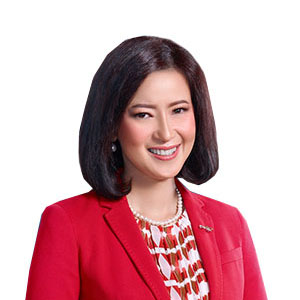Managing Director of the World Bank and Professor of FEB UI Deliver Inaugural Lecture to FEB UI 2021 New Students
Nino Eka Putra ~ PR FEB UI
DEPOK – (30/8/2021) Managing Director, Development Policy and Partnership at the World Bank, as well as Professor of the Faculty of Economics and Business, Universitas Indonesia (FEB UI), Prof. Mari Elka Pangestu, Ph.D., was a resource person in the First Introductory Economics Lecture 1, which was guided by Dr. Irfani Fithria Ummul Muzayanah, Head of Student Affairs Office, on Monday (30/8/2021).
The inaugural lecture began with remarks from the Acting Dean of FEB UI, Teguh Dartanto, Ph.D. Teguh said that the inaugural lecture for new FEB UI 2021 students was a momentum that gave the impression as a provision for the spirit of learning for the next four years at their beloved campus. This is in accordance with FEB UI’s commitment to build educational institutions based on humanity, respecting diversity, and encouraging equality. FEB UI encourages a friendly and collaborative learning atmosphere and avoids undermining each other, and it is hoped that new FEB UI students will not be afraid to continue to learn, be creative, and be adaptive in facing the development of a world full of uncertainty.
In her presentation, Mari Elka Pangestu explained that economics is a science that is very useful in making the best decisions or choices for individuals and companies based on available information, due to very limited resources (money, capital, natural resources, and time).
Economics plays an active role in various aspects of human life. Mari Elka said, “First, as a consumer, you must know how much to consume to maximize utility, evaluate costs and benefits. Second, as an entrepreneur, you calculate the quantity that must be produced to maximize profits at the cost and availability of inputs (capital, land, and labor) as well as consumer demand. Third, as a consultant or professional in a company, you help the company’s business by making optimal production decisions. Fourth, the government sector, you must decide on a policy in budgeting for the welfare of the people and the state.
In Economics, we are faced with trade-offs, meaning that when we want something, there are things that must be sacrificed, namely goods, energy, money, time, and things that might be fun at the moment. Usually the trade-off behavior cannot be felt directly but can be felt over a long period of time. In addition, opportunity costs are also a form of economic principle. In contrast to the trade-off, opportunity costs arise when the choice is limited, because there is an opportunity to make a profit. “An economist who thinks rationally on the margin, apart from looking at the opportunity costs, also looks at the costs and benefits of adding/subtracting a product that is consumed or produced,” said Mari Elka.
Meanwhile, Mari Elka revealed that prices can move the economy in reflecting the value of goods for buyers and the cost of producing goods, which is determined by the interaction of buyers and sellers, through market supply and demand. One of the pioneers of Economics, Adam Smith said “Prices are like an invisible hand that directs households and companies to make decisions that maximize the economic welfare of society.”
“The government’s role is to improve market outcomes, namely enforcing property rights rules/regulations so that if there is a violation/fraud, they will be immediately dealt with according to applicable laws, encourage efficiency to avoid market failures, and improve equality and welfare policies for the community,” said Mari Elka closing the inaugural lecture session attended by 844 participants. (hjtp)
(am)

